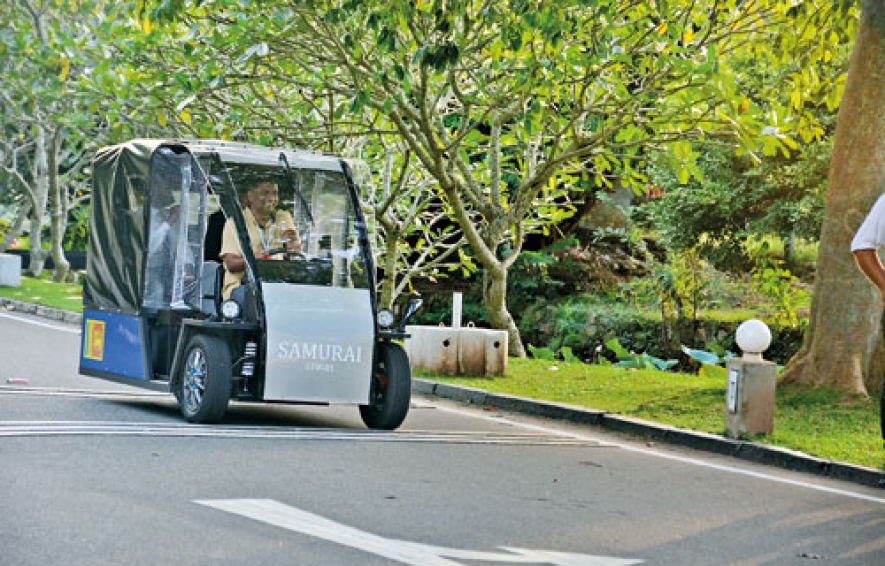The vehicle is powered by two batteries. It has a maximum speed of 60kph with test results showing a more powerful thrust than the normal fuel-powered three-wheeler. At normal cruising range, its batteries could last for about 80km.
The new kid on the block will be silent so the traditional “tuk-tuk” sound will be absent if it is introduced to the roads. Currently being tested at the University of Ruhuna, the Samurai will move to Peradeniya University for test runs on mountain terrains.
Designed by T-Plan Inc., a Japanese engineering consulting company that provides technical support for automobile giants such as Toyota, Daihatsu and Subaru, the Samurai is slightly larger than a conventional tuk-tuk and is designed differently.
The first notable difference is that it has two wheels in front and two at the rear. Japanese engineers say this design is a safety feature that gives the driver more control of the three-wheeler. Sudden turns while driving often result in conventional three-wheelers toppling over but the new design would be more stable. The two wheels in front would hinder reckless and haphazard turns, the designers said.
The changed front shape also provides more space for the driver’s legs, which will help reduce leg injuries in crashes. One of the major advantages of the electrical three-wheeler is that it is emission-free, which would help achieve climate change-related emission targets. Sri Lanka pledged to make a 10 per cent reduction of emissions in the transport sector, yet the country has large fleet of vehicles that consume fossil fuels. There are more than a million three-wheelers according to the Department of Motor Traffic, and this number is rising.
Electrification of transportation is an urgent task for Sri Lanka because the country spends a huge portion of its foreign reserves on importing fossil fuels, pointed out Professor Monte Cassim, an academic based in Japan who helped initiate the Samurai project. While some question the Samurai’s environmental benefits if electricity is largely generated from fossil fuel, Prof. Cassim has an answer. “Demand for electricity goes down from 10pm-5am and in this period the excess capacity for electricity generated from hydro power etc. goes wasted,” he said.
“Hence this time should be utilised for charging the batteries of vehicles to get the maximum eco-friendliness from the ‘electric vehicles’.” A basic problem with electric three-wheelers is the time it takes to recharge the batteries, with the Samurai’s batteries taking six hours to fully charge. The Samurai team came up with a unique solution: a battery exchange system.
According to this plan, pre-charged batteries would be kept in strategically located exchange stations. Drivers could exchange their used batteries for fully-charged units at these stations in a matter of minutes, in the time it takes to fill up a three-wheeler with petrol.For the battery-swapping model to be successful a mechanism was needed to inform the driver when the battery is running low and where the nearest exchange station is located.
Fujitsu Group, a well-known, innovative company in Japan, proposed customising its existing cloud-based information exchange system for the Samurai. The Samurai project is one of the initiatives nurtured through the Japan-Sri Lanka Comprehensive Partnership (JCP) set up with a mandate to stimulate science, technology, and innovation-led development in Sri Lanka through Japanese technology.
All-Island Three-Wheeler Drivers’ Union head Lalith Dharmasekara is positive about the electric vehicle. “The drivers are happy about most of the features and if practical issues can be minimised, the new three-wheeler would be popular,” he said.




















